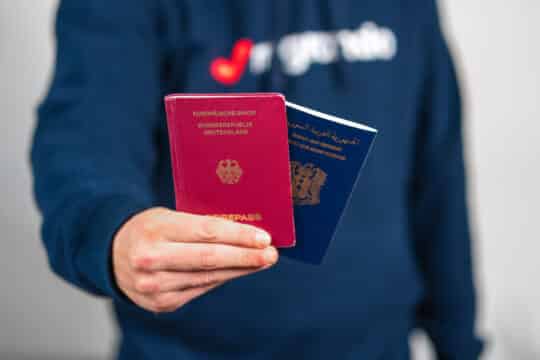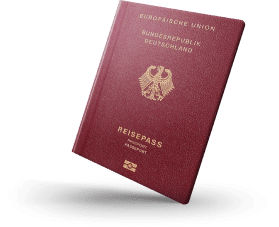Basic requirements of the Naturalization
The path to German citizenship is via Naturalization, a process that is accessible to non-EU citizens with the correct residence status. The following paragraph explains the importance of the duration of residence and the residence permit when applying for Naturalization.
Legal residence status
The prerequisite for Naturalization is currently legal residence in Germany for eight years. However, this will soon change with the new Naturalization Act. From June 27, 2024, the required period of residence will be reduced to five years. It will be even quicker for those who show that they are well integrated through language skills or voluntary work - they can shorten the waiting period to three years.
Right of residence and proof thereof
People who work or live in Germany often have a Residence permit, such as the EU Blue Card for highly qualified professions. You must have this and other residence permits ready as proof for your naturalization procedure. This shows that you have the right to live and work in Germany.
Various documents are required when you apply to Naturalization . These documents serve as proof of your identity, your residence status and your integration in Germany
Documents required for the Naturalization
To ensure that your documents for Naturalization are accepted, it is very important that they are complete. Important documents include identity documents, proof of livelihood and documents relating to integration, such as the language test or naturalization test.
Identity card and passport
First of all, you must prove your identity with a valid identity card or passport. These documents are essential to start the procedure.
- Valid identity card or
- Current passport
- Alternative identity documents (if it is not possible to obtain a passport).
Proof of livelihood
To be successful Naturalization you must show that you can support yourself and have your own income. This includes:
- Current payslips
- Proof of regular income
- If self-employed: financial reports or tax assessment notices
Integration documents for the Naturalization
Integration into German society is a key aspect of Naturalization. The following evidence is necessary for this:
- Language certificate (at least B1 level)
- Certificate that you have passed the naturalization test. This shows that you have knowledge of the legal and social order and living conditions in Germany.
- Declaration of loyalty: A written declaration in which you declare your commitment to the free democratic basic order of the Federal Republic of Germany. This also includes the promise not to support any activities that are directed against this order.
- Signed declaration of loyalty: Your personal commitment in which you declare that you respect the basic values of German society and will actively support them.
Proof of the duration of legal residence in Germany
To prove the duration of your stay, you will need documents such as
- Registration certificate
- Residence permit (e.g. EU Blue Card, Settlement permit)
These documents form the basis for your application to Naturalization and show that you meet the legal requirements for Naturalization . Make sure that all documents are valid and up to date to make the process as smooth as possible.

Special regulations and exceptions
Naturalization after a shortened stay
Currently, eight years of legal residence in Germany are still required to apply for German citizenship. This will change from June 27, 2024 with the new law and then the Naturalization goes after 5 years of legal residence.
However, there are already exceptions that make it possible to Naturalization after three, six or seven years
- Three years: Persons who are the spouse of a German citizen and live together in Germany can be naturalized after just three years if the requirements are met.
- Six years: People who have made exceptional integration achievements can apply for Naturalization after just six years. These achievements include the acquisition of a German language certificate at level C1 or higher, above-average professional achievements or special voluntary work. With the new Naturalization Act, it is now possible to apply with such achievements after just three years.
- Seven yearsProof of successful participation in an integration course can shorten the required period of residence to seven years. This shortening will no longer apply with the new Naturalization Act at the end of June 2024, as every foreigner in Germany will then be able to apply for Naturalization after just 5 years of legal residence.
These regulations recognize individual contributions to German society and reward those who actively and successfully integrate.
Multiple nationality
With the new Naturalization Act, which comes into force on 27 June 2024, dual citizenship will be officially recognized in law. This means that the renunciation of citizenship of the home country and the previous option obligation will no longer apply.
It is currently still the case that, in certain cases, people are permitted to retain their previous nationality in accordance with Section 12 StAG:
- Persons from countries that do not release their citizens from their nationality.
- Cases in which giving up the original nationality would cause unreasonable hardship, such as considerable economic disadvantages or political risks.
With the new Naturalization Act, Section 12 StAG will no longer apply and the exceptions will no longer be necessary.
Support with the naturalization process?
The naturalization process
Applying for German citizenship is a structured process that involves various steps.
To help you successfully complete this process, we offer you a detailed step-by-step guide to the application process as well as important information on the official processing times. The final step of the process is when you receive your naturalization certificate.
Application
The application process for Naturalization begins with the careful completion of the naturalization application. Here is a simple guide to help you with this:
- Obtaining forms: Obtain the current naturalization form from your local naturalization authority or download it from their website.
- Collection of documents: Compile all the necessary documents as described in the previous sections (identity card, proof of livelihood, proof of integration, etc.).
- Form completionFill out the form accurately. Make sure you answer all fields correctly and completely.
- Personal data: Enter your complete personal data.
- Duration of stay: Enter the exact duration of your stay in Germany.
- Integration: Mention your integration achievements and attach relevant certificates.
- Application review: Review the application together with a trusted person or advisor to avoid errors.
- Application submission: Submit the application together with all documents to the relevant naturalization authority.
Official processing times
The processing time for naturalization applications can vary and often depends on the complexity of the individual case and the workload of the authority. Here are some tips on how you can speed up the process:
- Completeness of documents: Make sure that your application and all associated documents are complete and correct. Incomplete applications can lead to considerable delays.
- Early submission: Submit your application as early as possible, especially if it is known that your authority has long processing times.
- Inquiries: Keep in touch with the authority and enquire about the status of your application in order to stay up to date and be able to respond quickly to requirements.
The processing time varies greatly. Three to six months are actually specified. According to the authorities, the average nationwide is one year.
The fact that many people who came to Germany as a result of the refugee crisis in 2015 are now entitled to submit applications has changed the situation once again. In addition, there are staffing problems at the immigration authorities. In our experience, it is not realistically possible to complete the naturalization process in less than three years without legal assistance, such as from Migrando.
Common problems and solutions
Various challenges can arise during the naturalization process. Common problems and their solutions are discussed below to help you get through the process as smoothly as possible.
Missing documents
A common obstacle at Naturalization is missing or incorrectly completed documents. This can delay the process or even lead to the application being rejected. Here are some tips to avoid this:
- Create a checklist: Make a list of all the documents you need.
- Collect documents at an early stage: Start collecting the necessary documents as early as possible.
- Fill out forms correctly: Check all information on the forms for correctness and completeness.
- Take advantage of legal advice: Take advantage of the legal advice offered by Migrando. The Naturalization with a lawyer is quicker, as it is fully substantiated and avoids any legal errors.
Reasons for refusal
The reasons for the rejection of naturalization applications can be manifold. Among the most common are
- Insufficient language skills: Make sure that you can prove that you have the required language skills.
- Lack of integration: Participate actively in the community and demonstrate this accordingly.
- Criminal offenses: Criminal convictions can prevent Naturalization .
- Incorrect documents: Check all submitted documents carefully.
- Errors by the authorities: Sometimes errors can also occur on the part of the authorities. It is important to follow the process closely and follow up on any discrepancies.
- Residence permit blocked for Naturalization : For some Residence permit such as §§ 16a, 16b, 20 AufenthG, Naturalization is blocked. The Residence permit must be changed first.
Long waiting times
Delays in the naturalization process can be frustrating. The following measures can help to minimize long waiting times:
- Completeness of the application documents: A complete and correct application speeds up the procedure.
- Communication with the authorities: Regular inquiries about the status of your application keep you informed and can speed up the process.
- Submit your application early: Submit your application early, especially if it is known that your authority tends to take longer to process.
- Lawsuit for failure of act submit your application: If Foreigners' office does not respond to your application within 12 weeks, you have the right to submit a Lawsuit for failure of act to submit an appeal. The authority is obliged to process and respond to your application within this period.
Do you still have questions?
FAQ - Frequently asked questions about Naturalization documents
For Naturalization you will need a valid identity card or passport, proof of sufficient German language skills, evidence of your integration into German society and proof of your livelihood.
In addition to identity documents, language skills, the naturalization test and proof of livelihood, Naturalization also requires a registration certificate and a declaration of loyalty to the free democratic basic order. If necessary, proof of special integration achievements must also be submitted.
To prove your financial stability, you should provide proof of income for the last six months.
A Naturalization can be refused if serious criminal offenses have been committed, activities against the free democratic basic order have been proven or insufficient integration into German society has been established.
A Naturalization after three years is possible for people who are married to a German citizen and live together in Germany. In addition, from 26 June 2024, the new Naturalization Act will also allow people who have made exceptional integration achievements, such as obtaining a language certificate at C1 level or above, as well as significant voluntary work or special professional achievements, to apply for German citizenship after three years.










